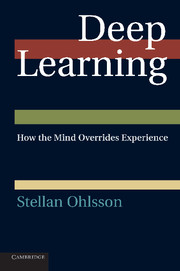2 - The Nature of the Enterprise
Published online by Cambridge University Press: 25 January 2011
Summary
In psychology, we are overwhelmed with things to explain, and somewhat underwhelmed by things to explain them with.
Robert CumminsAt [the information processing] level of theorizing, an explanation of an observed behavior … is provided by a program of primitive information processes that generates this behavior.
Allen Newell, J. S. Shaw and Herbert A. SimonA theory of change must be rooted in some initial conception of the thing that is changing, some working assumption, however incomplete and preliminary. This has been so in other sciences. Chemists had to describe material substances in terms of atoms and molecules before they could explain chemical reactions in terms of the rearrangement of atoms. The description of the double helix structure of DNA paved the way for a deeper understanding of genetic mutations and biological evolution, and the discovery that the crust of the Earth consists of continental plates floating on a molten core was a prerequisite for the plate tectonics theory of geological change. Likewise, the principles about the nature of mind set forth in this chapter serve as a backdrop for the study of cognitive change. They are not new, and they are not mine but represent a collective achievement of the cognitive sciences. Although the principles are unlikely to be entirely accurate, they constitute the best available framework for the study of deep learning. In a mature science, a chapter like this would be unnecessary, but as things stand, disagreements go deep, so a theorist needs to declare his intellectual commitments.
- Type
- Chapter
- Information
- Deep LearningHow the Mind Overrides Experience, pp. 24 - 50Publisher: Cambridge University PressPrint publication year: 2011



